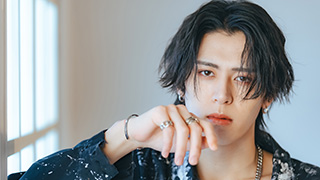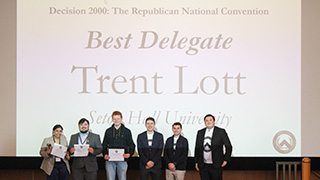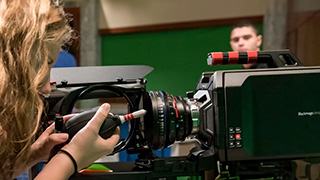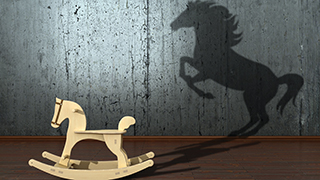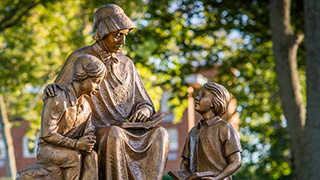Seton Hall's Rich Poetry Collection on View at Walsh Library
Wednesday, April 24, 2024
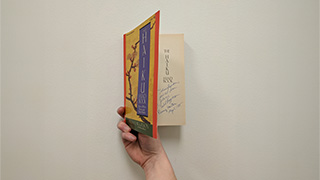
Inscribed copy of The Haiku Handbook by William J. Higginson, author and donor. From the rare book collection, Walsh Library.
Seton Hall University's rare book collection is a literary treasure trove that spans centuries and continents, from ancient works like a 1678 edition of Milton’s Paradise Lost - to the earliest known printed books from the fifteenth century, called incunabula (published just after the invention of the printing press). And the rare book collection features prominent modernist poetry which expands its diversity. Many of these works are personally inscribed to members of the Seton Hall faculty.
"Seton Hall’s collection of inscribed poetry books traces the evolution of Anglo-American modernist poetics, from Ezra Pound to Charles Olson to Joy Harjo," said Sarah Ponichtera, assistant dean for Special Collections, and the Gallery. "Afficionados of 20th century poetry will find much to delight them, from big names to obscure but surprisingly influential writers."
On April 30, the aforesaid works and many others will be available to view at Walsh Library during Seton Hall’s poetry month open house. Featuring a communal poetry board, chocolate and an opportunity to see some of the rarest poetry books in the collection, the university community can experience signed volumes by a myriad of lauded poets.
Seton Hall has a rich history of supporting poets and engaging them and their work in an academic environment. The core of the university’s collection originated in the Poetry in the Round series, begun in the early 1980s by English Professor John Harrington. This speaker series became a conduit for literary luminaries to visit Seton Hall, and it has brought some of the best contemporary writers from around the world to Seton Hall University for the past three decades.
Because Harrington had professional relationships with poetry icons like Lawrence Ferlinghetti (1989), Adrienne Rich (1989), J.D. McClatchy (1991), and A. R. Ammons (1995), all of them inscribed copies of their works to him, and these live in the Walsh collection today. Visiting poets to Poetry in the Round have included Joyce Carol Oates, Salman Rushdie, Russell Banks, C.K. Williams, Nadine Gordimer, Jamaica Kincaid, John Ashbery, and many others.
Other important gifts also bolstered the collection, such as a generous 2006 donation of William Higginson's personal library. Higginson, a poet and publisher from Paterson, NJ, wrote in haiku, and was well connected in the world of contemporary poetry. His collection includes the signed works of Margaret Atwood, Ezra Pound, Charles Olson, and Joy Harjo (the first Native American Poet Laureate of the United States).
Maria Gillan, another prolific New Jersey poet and a Paterson resident, also has a featured collection at Seton Hall. An Italian American, she has mentored a generation of young poets, and sends many exemplars of their works to share with the Seton Hall community. Gillan's verses explore cultural duality, intertwining the tapestry of her Italian heritage with contemporary English expression. One of her poems, "Public School No. 18, Paterson, New Jersey," echo the immigrant experience, well-capturing the concepts of alienation and adaptation. Others highlight universal themes of love, loss, and the passage of time.
The late Sister Margherita Marchione, a Ph.D. in Italian literature, knew many international poets whose inscribed works are also included in the collection on view. She was particularly interested in the poet Clemente Rebora, a poet and priest from Milan. Another recent donation includes the most renowned Irish authors of the 1990s. It features signed copies of John O’Donohue’s Echoes of Memory, Ciaran Carson’s The Alexandrine Plan, and the anthology Voices on the Wind, Women Poets of the Celtic Twilight by Éilís Ní Dhuibhne.
Poetry has timeless beauty, and when gifted or donated, works live on as both a teaching tool and a gift to future generations of Seton Hall students and faculty. Said Ponichtera, "These books of poetry not only trace literary relationships but also personal ones, as their inscriptions reveal the ways that poets encountered one another. This collection shows that Seton Hall was a nexus of poetic encounter throughout the mid and late twentieth century."
For more information about the poetry collection, or the activities scheduled during its viewing, please contact Sarah Ponichtera. Sharing one’s own poetry is encouraged, and the library is offering a take-home meditative archive coloring book intended to broaden the community’s interest in embracing poetry and expression.
Categories: Arts and Culture

